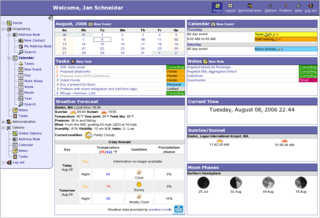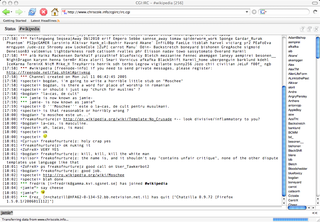
Internet Relay Chat (IRC) is a text-based chat system for instant messaging. IRC is designed for group communication in discussion forums, called channels, but also allows one-on-one communication via private messages as well as chat and data transfer, including file sharing.

ChatZilla is an IRC client that is part of SeaMonkey. It was previously an extension for Mozilla-based browsers such as Firefox, introduced in 2000. It is cross-platform open source software which has been noted for its consistent appearance across platforms, CSS appearance customization and scripting.

A web application is application software that is accessed using a web browser. Web applications are delivered on the World Wide Web to users with an active network connection.
XForms is an XML format used for collecting inputs from web forms. XForms was designed to be the next generation of HTML / XHTML forms, but is generic enough that it can also be used in a standalone manner or with presentation languages other than XHTML to describe a user interface and a set of common data manipulation tasks.

Google Talk was an instant messaging service that provided both text and voice communication. The instant messaging service was variously referred to colloquially as Gchat, Gtalk, or Gmessage among its users.

A dynamic web page is a web page constructed at runtime, as opposed to a static web page, delivered as it is stored. A server-side dynamic web page is a web page whose construction is controlled by an application server processing server-side scripts. In server-side scripting, parameters determine how the assembly of every new web page proceeds, and including the setting up of more client-side processing. A client-side dynamic web page processes the web page using JavaScript running in the browser as it loads. JavaScript can interact with the page via Document Object Model (DOM), to query page state and modify it. Even though a web page can be dynamic on the client-side, it can still be hosted on a static hosting service such as GitHub Pages or Amazon S3 as long as there is not any server-side code included.
Push technology or server push is a style of Internet-based communication where the request for a given transaction is initiated by the publisher or central server. It is contrasted with pull, or get, where the request for the transmission of information is initiated by the receiver or client.
The Mozilla application framework is a collection of cross-platform software components that make up the Mozilla applications. It was originally known as XPFE, an abbreviation of cross-platform front end. It was also known as XPToolkit. To avoid confusion, it is now referred to as the Mozilla application framework.
A web framework (WF) or web application framework (WAF) is a software framework that is designed to support the development of web applications including web services, web resources, and web APIs. Web frameworks provide a standard way to build and deploy web applications on the World Wide Web. Web frameworks aim to automate the overhead associated with common activities performed in web development. For example, many web frameworks provide libraries for database access, templating frameworks, and session management, and they often promote code reuse. Although they often target development of dynamic web sites, they are also applicable to static websites.

Dojo Toolkit is an open-source modular JavaScript library designed to ease the rapid development of cross-platform, JavaScript/Ajax-based applications and web sites. It was started by Alex Russell, Dylan Schiemann, David Schontzler, and others in 2004 and is dual-licensed under the modified BSD license or the Academic Free License.

CGI:IRC is a CGI program written in Perl that allows access to IRC via a web browser. It is designed to be flexible and has many uses such as an IRC gateway for an IRC network, a chat-room for a website or to access IRC when stuck behind a restrictive firewall.
Comet is a web application model in which a long-held HTTPS request allows a web server to push data to a browser, without the browser explicitly requesting it. Comet is an umbrella term, encompassing multiple techniques for achieving this interaction. All these methods rely on features included by default in browsers, such as JavaScript, rather than on non-default plugins. The Comet approach differs from the original model of the web, in which a browser requests a complete web page at a time.

Aptana, Inc. is a company that makes web application development tools for use with a variety of programming languages. Aptana's main products include Aptana Studio, Aptana Cloud and Aptana Jaxer.

qooxdoo is an open-source Ajax web application framework. It is an LGPL- and/or EPL-licensed client-side and server-agnostic solution, and includes support for professional JavaScript development, a graphical user interface (GUI) toolkit and high-level client-server communication.
A web chat is a text-based system that allows users to communicate in real-time using easily accessible web interfaces. It is a type of Internet online chat distinguished by its simplicity and accessibility to users who do not wish to take the time to install and learn to use specialized chat software. This trait allows users instantaneous access and only a web browser is required to chat. Users will always get the latest version of a chat service because no software installation or update are required.
Freenode, stylized as freenode and formerly known as Open Projects Network, is an IRC network which was previously used to discuss peer-directed projects. Their servers are accessible from the hostname chat.freenode.net, which load balances connections by using round-robin DNS.
ZK is an open-source Ajax Web application framework, written in Java, that enables creation of graphical user interfaces for Web applications with little required programming knowledge.
Plouf's Java IRC (PJIRC) is a web-based open-source IRC client that is written in Java. Any web browser that supports the Java Runtime Environment, or an alternative Java interpreter, can use the applet. Many IRC networks have a public installation of the applet for their network.










